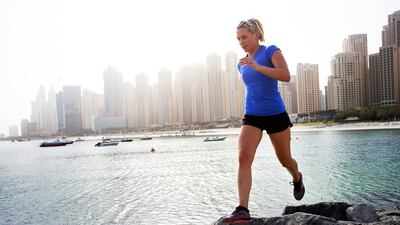Running a 51-kilometre ultra marathon up Mount Eiger in Switzerland may not be everyone’s idea of a holiday, but for Heidi Jones, health coach and brand ambassador for Lululemon Athletica, that was how she spent last summer. The British entrepreneur set up her eponymous health coaching practice in 2015 following a nine-year stint as a secondary school design technology teacher. The 34-year-old, who has lived in Dubai for seven years with her husband, spends her spare time training for ultra marathons and encouraging her fellow residents in Dubai to run at her weekly run club at Dubai Marina.
5am
I like to be up early to focus on the day ahead. I get into my training gear straight away, have a quick coffee and a home-made energy ball, (dates and nuts) jump in the car and head to Innerfight, a gym I go to, where I train for two hours. Or I might just hit the lakes in the Springs for a long run. After training I always have a green smoothie with activated nuts and seeds to set me up for the day ahead. I took up running five years ago to help me relax and went from 5 kilometre runs to mammoth 50km endurance races in the space of 12 months and set up my own running club. The drive, focus, determination and discipline involved in achieving this and my desire to help others reconnect with their mind, body and spirit sparked my interest in Health Coaching. So in 2015 I completed a Certificate in Integrative Health Coaching and the International Associating of Health Coaching with Integrative Nutrition, an American-based company.
8am
I start the working day by planning my schedule and the tasks I need to do in 90-minute slots. I spend my mornings writing at my desk and seeing clients. Some come to my office or sometimes I go and meet them at inspirational locations – like the beach. I love it down there and I sometimes have breakfast there to take stock. It inspires me to help my clients become the best that they can be; setting their goals for life, nutrition, activity and health goals in general. Clients usually see me for six months, every other week and we focus on their goals, whether it is weight loss, to address a health issue or to become more active. A former colleague lost a lot of weight and is now a dedicated runner. Some days I deliver courses or workshops so I am out and about. I like to keep things varied. Between clients I’ll drink some herbal tea, lots and lots of water and enjoy my home-made bliss balls to keep my energy levels up.
12pm
It’s lunchtime for me and I usually eat at home. I like sitting outside in my garden. It’s a real luxury to eat lunch in the garden after years of teaching and grabbing lunch on the go and during this time I take 10-15 minutes for myself. A typical lunch will be a home-made quinoa salad with cashews, arame and a home-made dressing.
12:30
My afternoons vary. I could be travelling to deliver a workshop, my most recent being at Greenheart Organic Farm shop, where I teach cooking methods and plant-based recipe ideas to spread the word that counting nutrients is far more beneficial than counting calories. Or I’m at my home office writing up client notes or seeing clients for coaching sessions.
5pm
When I’m getting ready for an event I train twice a day, so I usually do some CrossFit around this time three or four times a week. I’ll also increase my running to 50-60 km per week with two long runs, so sometimes my morning training will be CrossFit and my afternoon training would be a 30km run. I mix it up depending on how I’m feeling. My next challenge this summer is a 61km race in the French Alps, Trail Verbier and I will also be running the Wadi Bih 50k and the Big Stinker 45K in the UAE with my husband. We race together a lot, but we also have lots of independent events that we take part in.
7pm
I like to have dinner with my husband at least twice a week (we have very different schedules so it’s not always possible) – salmon and greens with sweet potato with lots and lots of water to drink.
8pm
Winding down for the evening involves reading. I love to read and always strive to learn new things. I am currently reading Black Box Thinking by Matthew Syed. I also do 20 to 30 minutes of yoga each night before bed.
9pm
I am in bed. I try to get as much sleep as possible to maintain my healthy lifestyle.
business@thenational.ae
Follow The National's Business section on Twitter

